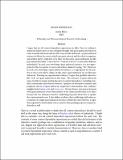Quasi indexicals
Author(s)
Khoo, Justin Donald
DownloadAccepted version (481.5Kb)
Terms of use
Metadata
Show full item recordAbstract
I argue that not all context dependent expressions are alike. Pure (or ordinary) indexicals behave more or less as Kaplan thought. But quasi indexicals behave in some ways like indexicals and in other ways not like indexicals. A quasi indexical sentence ϕ allows for cases in which one party utters ϕ and the other its negation, and neither party's claim has to be false. In this sense, quasi indexicals are like pure indexicals (think: “I am a doctor”/“I am not a doctor” as uttered by different individuals). In such cases involving a pure indexical sentence, it is not appropriate for the two parties to reject each other's claims by saying, “No.” However, in such cases involving a quasi indexical sentence, it is appropriate for the parties to reject each other's claims. In this sense, quasi indexicals are not like pure indexicals. Drawing on experimental evidence, I argue that gradable adjectives like “rich” are quasi indexicals in this sense. The existence of quasi indexicals raises trouble for many existing theories of context dependence, including standard contextualist and relativist theories. I propose an alternative semantic and pragmatic theory of quasi indexicals, negotiated contextualism, that combines insights from Kaplan 1989 and Lewis 1979. On my theory, rejection is licensed with quasi indexicals (even when neither of the claims involved has to be false) because the two utterances involve conflicting proposals about how to update the conversational score. I also adduce evidence that conflicting truth value assessments of a single quasi indexical utterance exhibit the same behavior. I argue that negotiated contextualism can account for this puzzling property of quasi indexicals as well.
Date issued
2020-01Department
Massachusetts Institute of Technology. Department of Linguistics and PhilosophyJournal
Philosophy and Phenomenological Research
Publisher
Wiley
Citation
Khoo, Justin, "Quasi indexicals." Philosophy and Phenomenological Research 100, 1 (Jan. 2020): p. 26-53 doi 10.1111/PHPR.12519 ©2020 Author(s)
Version: Author's final manuscript
ISSN
1933-1592